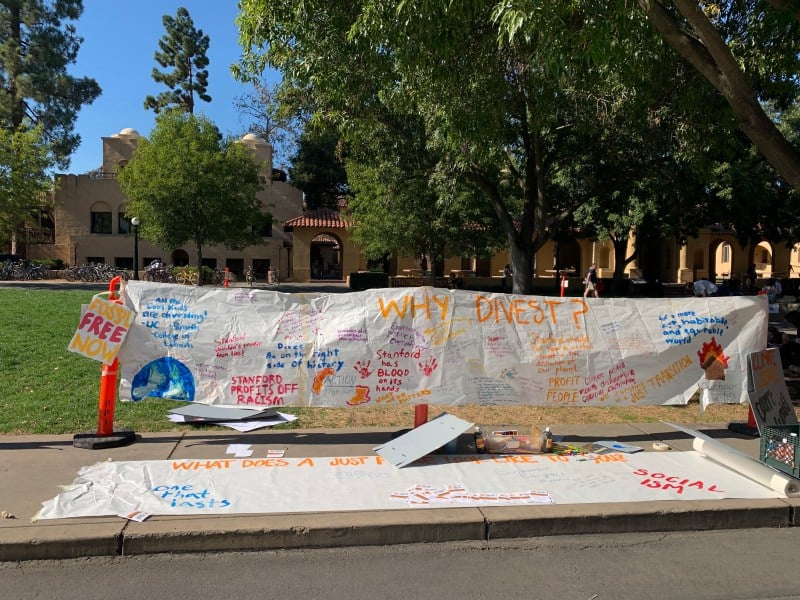“Stanford is complicit in the climate crisis” and “Dear Stanford, it’s time to prioritize our futures over your profit” were among a myriad of messages posted on large banners across White Plaza on Friday afternoon during Fossil Free Stanford’s second peaceful sit-in of the year. The group, which has been active on campus since 2012, is demanding that the University divest from fossil fuels by Earth Day 2020.
Members and supporters were invited to sit in on the protest of the University’s investment policies over a three hour period.
“Because they have said [they] will not divest from oil and gas…it means to us that they are invested in [fossil fuels],” said Zoe Brownwood ’22, one of the sit-in’s organizers.
In the spring of 2018, Fossil Free released an ASSU divestment referendum calling on members of the graduate and undergraduate communities to vote in favor of fossil fuel divestment. During this time, the group compiled a list of frequently asked questions, in which they wrote that “according to recent SEC filings, Stanford University’s direct stock holdings include investments in fossil fuel companies including ExxonMobil, Chevron and Royal Dutch Shell. Because investments made through external managers are not publicly disclosed, we cannot accurately gauge the full extent of the Stanford Management Company’s fossil fuel investments.”
The amendment ultimately garnered 65 percent of the graduate vote and 70 percent of the undergraduate vote, but the University has yet to divest from fossil fuels.
According to Fossil Free members and attendees, in total, last week’s sit-in attracted the support of between 40 and 60 individuals. While this week’s attendance was certainly slimmer, the sit-in still garnered support from a group of about 20 students, with more passersby dropping in and asking questions throughout the three-hour duration.
Exactly six months ago, the group marched to the office of Vice Provost for Student Affairs Susie Brubaker-Cole to formally deliver their proposal for divestment. While the group has not received a formal response since then, Board of Trustees Chair Jeff Raikes ’80 recently said that the Board’s Special Committee on Investment Responsibility has established a task force that “will engage with FFS and with others in the University community to listen and understand the underpinnings of [Fossil Free’s] proposal more deeply.”
Fossil Free failed to reach success with their previous 2016 divestment proposal. After reviewing its responsible investment policies, the Board said that “given how integral oil and gas are to the global economy, the trustees do not believe that a credible case can be made for divesting from the fossil fuel industry until there are competitive and readily available alternatives.”
The Board continued by acknowledging that “despite the progress being made, at the present moment oil and gas remain integral components of the global economy, essential to the daily lives of billions of people in both developed and emerging economies.” Their statement also noted that “some oil and gas companies are themselves working to advance alternative energy sources and develop other solutions to climate change.”
Last winter, the Board announced the University’s commitment to new ethical investment policies which mandate that investments rise to the level of being “abhorrent and ethically unjustifiable” in order to qualify for divestment. Fossil Free supporters emphasized their frustration with the vagueness of this announcement; Stanford has still not directly addressed whether or not they consider it “abhorrent and ethically unjustifiable” enough to divest from fossil fuels.
“There is a country-wide demand for every university to divest from fossil fuels by Earth Day 2020…many universities have already achieved that…Stanford is falling behind everyone else,” said Drive Rojrachsombat ’23, who is a member of the Fossil Free organizing team.
This includes all of the UC schools, whose complete divestment from fossil fuels constituted the largest divestment in university history. UC Berkeley, the last of the UCs to divest, did so formally this October.
Brownwood acknowledged the history of student activism on Stanford’s campus, referencing the success of the anti-apartheid movement in the 70s and 80s. A 2015 article by The Daily chronicled “Stanford’s rich history of divestment movements,” citing South African apartheid, Sudanese genocide and fossil fuels as examples.
Brownwood believes that this record is evidence of the potential success of the Fossil Free movement.
Fossil Free activism has worked before — it previously led to the University’s 2014 divestment from coal. While Brownwood acknowledged that Stanford’s investment practices lack transparency, Fossil Free believes that endowment investment is deeply entrenched in the fossil fuel industry.
“This is not something that the Board of Trustees or the University are going to do on [their] own because they are making money from the fossil fuel industry…this movement has to come from the people whose future it will affect…and I think student activism is the only way to bring that change about,” she said.
Organizers noted that, if the University continues to remain silent on the issue of fossil fuel divestment, they are prepared to accelerate their movement.
Sit-in attendees also emphasized the hypocritical nature of Stanford’s commitment to combating climate change, specifically citing the University’s campaign to create zero-waste campus by 2021.
“The University can’t claim that they want to create a zero-waste campus while investing in fossil fuels,” said Emily Brieant ’23, who attended the sit-in for the first time.
Fossil Free maintains that, while sustainability campaigns like those that encourage individual action are beneficial and necessary, they do not compare to the devastating implications of Stanford’s investment in the fossil fuel industry.
“[Individual actions] are so small compared to law and policy change,” Rojrachsombat said. “Between encouraging 1,000 students to go vegan [and divesting] billions of dollars in oil, which is more effective?” he pondered.
The headline of this article has been corrected to reflect the accurate name of Fossil Free Stanford.
Contact Georgia Rosenberg at georgiar ‘at’ stanford.edu.
